
By Murray Ewing. Originally published in Baleful Head #1, 1997 (with updates at the bottom of the page)
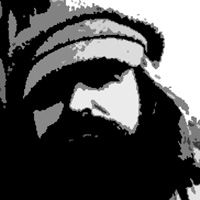
According to the sleeve notes of his band Deep Fix's 1975 New World's Fair album, Michael Moorcock, "has for years been associated, as no other novelist, with the rock scene." His involvement with music began early: "I was fifteen. I was playing guitar in a whorehouse."
Science fiction and fantasy have permeated rock music since the 60s. Mostly, it has been in the form of borrowing from the pool of SF & fantasy images and ideas which are now an accepted part of popular culture. Few authors have had their work specifically interpreted or celebrated, and even fewer have had a direct influence. Michael Moorcock is one of that few.
Pink Floyd's Set the Controls for the Heart of the Sun was inspired by The Fireclown (1965, later titled The Winds of Limbo), there have been at least two albums called Stormbringer, and countless heavy metal bands have paid him homage, including Diamond Head (whose Living On Borrowed Time album was based on the story of Elric) and the band Tygers of Pan Tang (another Elric reference). There are no doubt countless others.
Moorcock has also written lyrics for bands, and, being a "sometime musician" has recorded and performed his own music. He does, however, get a bit vague as to what he worked on, and confesses that he doesn't own some of the albums he is on, so there is no definitive list. Three bands, however, feature prominently, and his involvement with them will be covered in this article.
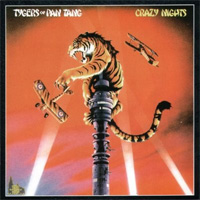
Moorcock's first recording is, most probably, lost forever.
"I had begun in the mid 1950s, doing rock and roll and bluegrass as well as R&B and what was known as 'skiffle' — an American white and black folk music played up tempo for dancing... I cut my first demo with EMI in 1957 and it was, even by the standards of the day, considered too dreadful to release."
No doubt this encouraged Moorcock to concentrate on his literary career, as in the same year (at the age of 16) he started editing Tarzan Adventures, then moved on to The Sexton Blake Library.
"In the early 1970's Ladbroke Grove [where he was living] was and still is crammed with rock and roll people and it was almost impossible not to know at least half-a-dozen musicians who were either already famous or would soon become famous...it felt a little weird if you didn't have a recording contract."
One place where such "rock and roll people" as David Bowie and Marc Bolan hung out was the Mountain Grille café, which makes an appearance in Moorcock's 1981 novel, The Entropy Tango. After describing its layout in great detail, Moorcock then goes on to list, table by table, its occupants, which include most of the early members of Hawkwind (whose fifth album was called The Hall of the Mountain Grill).
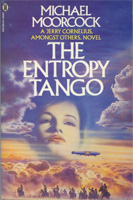
Hawkwind could no doubt be classed as a "one-hit wonder", because only their 1972 single, Silver Machine ever got anywhere significant in the charts (number three). But that would be ignoring the fact that, since they formed in 1970, they have released at least an album every year, and are still going strong. It is even more surprising when you learn that virtually every album has a new line-up, the only permanent member being singer, guitarist, keyboard-player & songwriter Dave Brock. Their music is experimental and varied enough to carry them that long, and has always been marked by the use of science fiction and fantasy imagery (their second album, X In Search of Space, was originally issued with a booklet describing the voyage through time, space and reality by the crew of the spaceship Hawkwind, and their most recent studio album at the time of writing, Alien 4, contains such tracks as Abducted, Beam Me Up and Xenomorph). The band were at their most referential in the mid-70s, with "oral space poet" Robert Calvert as frontman (upon whose second solo album, Lucky Leif and the Longships, Moorcock played banjo), when their albums included such songs as High Rise (based on J. G. Ballard's novel), Damnation Alley and Lord of Light (based on Roger Zelazny novels).
"One of the main reasons why Hawkwind are still going strong these days," Moorcock says, "is because the current scene has caught up with them... Instead of being self-conscious and pseudo-intellectual, they are actually of the electronic age."
Moorcock was helping to organise concerts "under the motorway in Portobello Road" when he first met the band. "They seemed like barbarians who'd got hold of a load of electrical gear." Soon he was performing with them.
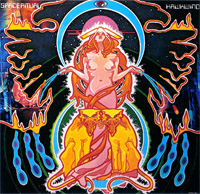
The band's first live album, Space Ritual (1973), features two "songs" by Moorcock (neither performed by him), though they are more in the way of poetry readings. Black Corridor is taken word-for-word from the opening paragraphs of Moorcock's 1969 novel of the same name, and is used as an intro to the band's paean to the spaceward urge, Born to Go. Moorcock's other contribution, Sonic Attack, was to become a regular at concerts for years to come, perhaps because it gave the band a good excuse to get really weird. It starts: "In case of sonic attack on your district, follow these rules" — and ends with the repeated injunction to, "Think only of yourself."
Three more read-not-sung pieces appeared on the 1975 album, Warrior on the Edge of Time, of which Moorcock himself read two. The album ends with a Moorcock/Brock-written rocker in the Silver Machine vein, Kings of Speed. Following this, the band were rejoined by Robert Calvert, and entered a four-album golden age. It was not until the early 80s that Moorcock worked with them again.
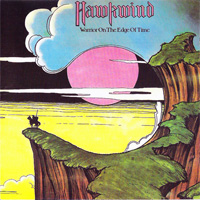
1981's Sonic Attack album features the first studio recording of Sonic Attack and two other tracks co-written with Moorcock, one of which he sings. Both deal with language-induced paranoia, from the "They are trying to rob you of your right to communicate" of Psychosonia, to the "Investigate the meaning of your sentence...Question the nature of your orders" of Coded Languages. Choose Your Masques, on the 1982 album of the same name, is about choosing sides in the battle between Chaos and Law, and although it is credited to L. Steele & Dave Brock, 1985's Live Chronicles credits Moorcock and Brock instead.
Moorcock's voice has a tragic, almost doomed quality that makes it the perfect voice for a world-weary Elric. Running Through the Back Brain (from Zones, 1984), however, features a bit of a dodgy vocal performance — or one that brilliantly personifies the disintegrating psyche of the song's protagonist, depending upon how you look at it.
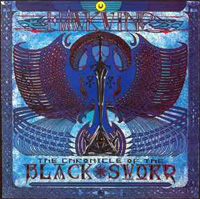
1985 saw release of Hawkwind's Chronicle of the Black Sword, all but one of whose songs are based on the Elric saga (the other, Needle Gun is about Jerry Cornelius). Moorcock co-wrote only one, Sleep of a Thousand Tears, but went on tour with the band to read some between-songs narration. He can be seen on the video, also called Chronicle of the Black Sword (recorded at the Hammersmith Odeon), along with all the dancers, video sequences and stage effects that made the concert into a show. The band released a live album, Live Chronicles, featuring even more Elric-related songs and instrumentals, and is one of their best albums.
One album which Moorcock does mention appearing on is 1987's Out & Intake, a collection of previously unreleased live recordings. The thing is, he is not credited on the album itself, but the (brief) vocals on the track 5/4 (named after its time signature) might well be his.
As well as providing Moorcock with an outlet for his musical talents, Hawkwind also have the honour of having made their own impact on science fiction, through two novels written by Michael Butterworth, The Time of the Hawklords (1976) and Queens of Deliria (1977), both of which credit Moorcock as co-author, though he only suggested the idea for the first.
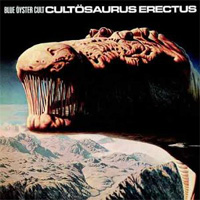
Before his early-80s involvement with Hawkwind, Moorcock co-wrote three songs with the U.S. band Blue Öyster Cult — or, at least, with one of its members: "I've played with Eric Bloom. I haven't played with Blue Öyster Cult, but I've played with bits of the band."
Blue Öyster Cult are another band with a long string of albums and just one hit (1976's (1978 in the UK) Don't Fear the Reaper). Like Hawkwind, they are musically inventive and, lyrically, can get quite surreal. Fantasy, horror and science fiction have influenced their music from the start, and apart from the Moorcock collaborations they have recorded two film tributes (Godzilla and Nosferatu). As far as their original songs go, they are one of the few bands whose songs (and ideas) can rival their literary counterparts for intellectual depth, particularly their early albums and 1988's Lovecraftian Imaginos album, about the growth of a supernatural evil that culminates in the first World War.
The first two collaborations with Moorcock are based on his novels. The Great Sun Jester is based on The Fireclown, and Black Blade is a mini rock-opera rendering of the Elric saga. Neither is (lyrically at least) up to the best of the band's material, but nor are they as bad as the worst. The third, however — Veteran of the Psychic Wars — is brilliant, and deservedly became a concert regular, and was used as part of the soundtrack to the 1981 animated fantasy film, Heavy Metal.
In the early 1970s, at the prompting of Dave Brock, Moorcock demo'd two songs he'd written, Starcruiser and Dodgem Dude. Shortly afterwards, as he says, "I somehow found myself having lunch with an A&R man from Liberty records who casually asked me when I intended to schedule my first LP."
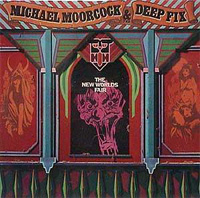
He formed Deep Fix in 1972 (though the name had appeared as early as 1965 in The Final Programme, quoted above). Their first and only album, New World's Fair, was released in May 1975. The songs were written by the three core members — Moorcock (who sang, narrated, and played guitar, banjo and mandolin), Steve Gilmore (guitar and vocals) and Graham Charnock (guitar, bass and vocals), who had helped to edit Moorcock's magazine, New Worlds, as well as having written several SF stories and journalism for the underground press. Ex-Hawkwind member Terry Ollis drummed for them at first, but most of the album features Simon King (also ex-Hawkwind), along with a cast of "associated members", including Dave Brock and Nik Turner (of Hawkwind), Snowy White (backup guitarist for Pink Floyd), and Simon House and Pete Pavli (both of whom came from the Third Ear Band, later with Thin Lizzy). Lyrics to Song for Marlene (Dietrich, that is) were written by US actor/screenwriter Sam Sheperd.
New World's Fair is a concept album. Most of the songs follow a plot, and those that don't are fitted into the scheme by Moorcock's narration. As he says, "The idea was mine and Dodgem Dude in particular, set the theme."
The Dodgem Dude, also known as the Fairground Buccaneer and the Candy Floss Cowboy, heads for the fairground to try and regain some of the "dreams I had last year". But the fairground has "nothing that isn't secondhand, nothing to make you dream the dreams you had, when I last came to town." He distracts himself with the Wall of Death and other rides, but is no better off when it all comes to an end ("It certainly moved, that sweet carousel/ It came to a stop and I was in hell"). The album ends with Dude's Dream, which philosophises in the face of a slow, nuclear-radiation death: "Let's laugh and make the most of it / After all, we're only dying."
The music is very good. 16 Year Old Doom sounds almost like early ZZ Top, and Song for Marlene like the Velvet Underground, but for the most of it, the music has its own sound. Vocal-based, rather than music-based, the songs vary from folky to rocky, with only Octopus letting the side down by being a 70s cliché. The album has recently been released on CD, with two tracks not to be found on the original record — Candy Floss Cowboy, which seems to be essential to the "story", and Brothel in Rosenstrasse, which is, along with Dodgem Dude, Last Merry Go Round and Dude's Dream, just brilliant (and is, according to Moorcock "in many ways more typical of Deep Fix").
The band performed at several concerts, the last of which was Nik Turner's Love Inn, at the Roundhouse, Chalk Farm, in 1978 — "in many ways the Grand Finale of the alternative music scene as we had experienced and enjoyed it."
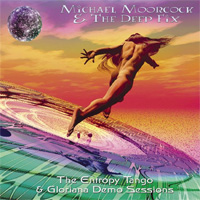
Moorcock went on to start a few other musical projects, but neither got beyond the demo stage. He mentions songs written with Pete Pavli for both Gloriana and The Entropy Tango, the latter of which was to be released as a large-format, illustrated book packaged with an LP, until the publishing company went out of business. The NEL edition still contains the lyrics for 15 songs, but by the time this was released, Moorcock was too busy with writing to be able to record the songs properly.
Only one other item remains to be listed, and that is an instrumental called Time Centre, which appears, along with Dodgem Dude on a compilation CD, Hawkwind — The Best of Friends and Relations, which, features songs from solo projects and bands associated with Hawkwind.
In Death is No Obstacle, Moorcock says, "Unfortunately rock 'n' roll itself didn't develop as much as I hoped... No, so far the novel is still proving to be the most flexible and complex medium of all." And, in an interview on GLR in 1995, he gives another reason for not pursuing the career to stadium-level: "There's nothing better than going on stage at the Hammersmith Odeon with two thousand people, and getting approval just for stepping on stage. Everybody cheers. You can't get better than that... But in a sense it is just a bit too easy for me... And with writing novels there's a lot more hard work involved. And it's slightly less boring than recording."
But don't let that put you off his music: "I put everything I have into it while writing songs or performing, just as I put everything I have into my books when I'm doing them. It's not worth doing otherwise."
Followup, 2006: The above was written in 1997. Hawkwind are still going strong, though not as a three-piece. They are still releasing albums. (Michael Moorcock guested on two tracks of their Yule Ritual live album in 2000, contributing vocals over the phone!) Blue Öyster Cult's most recent album was released in 2001, lyrics partly written by author John Shirley. And even Deep Fix have released an album recently — Roller Coaster Holiday which mops up various demos and alternative takes of the band's debut album.
Followup, 2009: Another Deep Fix outtakes album, The Entropy Tango & Gloriana Demo Sessions, was released in 2008 from Noh Poetry Records.
Followup, 2021: 2019 saw a new album from The Deep Fix, Live At The Terminal Café, issued by Purple Pyramid Records (a division of Cleopatra Records). Despite the title, it’s not a live album (see this interview & article for more on its origins), and is made up of songs not previously released, mostly based around Moorcock’s “Blood” books. This album is available digitally at Bandcamp.
If you’ve found this page useful, consider buying me a Ko-fi.
